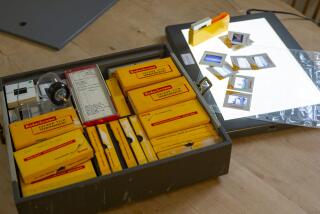Remembering When : What Is It That Compels Us to Search for Souvenirs?
- Share via
Souvenir --you don’t even hear the word much anymore. It comes from the French for to remember and from the Latin for to come to mind . It’s defined as a memento, a keepsake, a remembrancer--all old-fashioned words.
Old-fashioned too are the souvenirs you remember from your childhood: the deerskin coin purses burned with an Indian head or a wigwam, the little birchbark canoes and wooden tomahawks, the sweet-grass woven baskets, the snow scenes in glass hemispheres, the coins and medals you were sure were made of gold.
Now, it’s difficult to find a real souvenir, an article that is distinctive to the place you’re visiting--made just to be taken home. Yes, there are things with the place name on them--Los Angeles, California or Hollywood--those ubiquitous T-shirts, badly designed scarfs or shiny plastic wallets. But the souvenirs you used to see are gone: the little crates of oranges, the silver spoons, the emblazoned ashtrays. Manufacturers and retailers respond to a more sophisticated market, to people who, if they’re not flying somewhere themselves, at least see foreign places on television every day. Traveling has become commonplace; it’s no longer so exciting to go from one place to another.
Yet some stubborn recalcitrance within us defies this philosophy of the instant, disposable moment and compels us still to search for souvenirs. In Europe, how we pounce on the tin buttons, the pins, the cloth badges, knowing as we buy them that we will never put them on anything. They will live in a drawer at home, as will the treasured wooden pencils; who could bear to plunge them into the sharpener and watch the gilt castles disappear?
Failing to find anything of taste on commercial counters, we are not disheartened. Our accidental finds are usually the best, anyhow: the red seashell we found on the rainy day we were the only ones on the island; the bottle cap with the thistle design, gleaming up from a Glasgow gutter; the mistle thrush’s spotted feather, lying on a bench in Amsterdam. And the bits of sea-washed glass--surely we will never forget where we found this blue one, or this pale-green one--but we do forget, and yet we never throw them away. They mark important, happy discoveries. They rest on a windowsill or in a box at the back of a shelf forever. They will be sorted out years later by a stranger who will never know that these bits going into the rubbish are from a day at the Irish Sea.
Never thrown away are all those invisible souvenirs we carry around: that look--that look he gave you just before he went away, a haunting souvenir you wish you could lose. But there are happy souvenirs, too-- the restaurant in Arizona where you couldn’t stop laughing; that woolly dog that bounded up to you on a strange Boston street; the afternoon you spent alone, dabbling about the creek. They lie in your mind as permanent as any seaside stones.
These are the best souvenirs, the true remembrancers--the memories of times and emotions that can never be hidden in a drawer, that can never be lost. They are like toys that never fade or grow rusty; they stand forever as strong and new as young trees.






